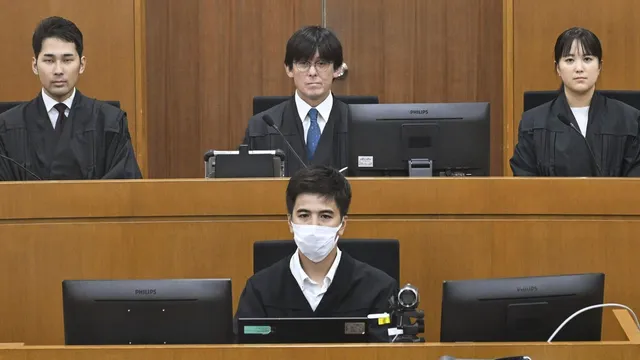
US Marine sentenced to seven years for sexual assault in Okinawa
2025-06-25 10:03- A U.S. Marine, Lance Corporal Jamel Clayton, was convicted in Okinawa for the sexual assault of a woman, leading to a seven-year prison sentence.
- The incident, which occurred in May 2024, triggered significant local anger regarding safety and the presence of American troops in Okinawa.
- The case highlights ongoing concerns about crime associated with U.S. military personnel stationed in Japan.
Express your sentiment!
Insights
In Japan, a 22-year-old U.S. Marine named Lance Corporal Jamel Clayton has been sentenced to seven years in prison after being found guilty of sexually assaulting a woman in her 20s in May 2024. The incident took place in the village of Yomitan, on the main Okinawa island, an area that hosts a significant number of U.S. military personnel and facilities. Clayton was accused of choking and attacking the victim, causing physical injuries that took two weeks to heal. His conviction has intensively raised concerns over safety and crime related to American forces stationed on the island. The presiding judge, Kazuhiko Obata, highlighted the credibility of the woman’s testimony, which was provided remotely and anonymously. Although Clayton denied the charges and his defense argued the woman was intoxicated and inconsistent in her statements, the judge emphasized that her prompt reporting to the police and a friend reinforced her reliability. Prosecutors initially sought a ten-year sentence, emphasizing the malicious nature of the attack and the potential threat to the victim's life. This case came amid ongoing frustrations among Okinawa residents regarding the U.S. military's presence on the island, which has historically been associated with various crimes, accidents, and environmental concerns. Okinawa hosts 70% of U.S. military bases in Japan while accounting for only a small fraction of the nation's land. This disparity has led to a strong local resentment against American troops, fueled by previous incidents of serious crimes by service members, including sexual assaults. The growing anger over such incidents has led to calls for reforming the Status of Forces Agreement that governs the legal status of U.S. troops in Japan and limits Japanese authorities' jurisdiction over crimes committed by military personnel. This situation has sparked local protests and demands for U.S. bases to be moved off the island entirely. As the trial concluded, the Japanese government has faced increased pressure to address safety concerns, resulting in discussions about cooperative efforts for better oversight of U.S. military actions in Okinawa.
Contexts
The history of US military presence in Okinawa is a significant aspect of both American and Japanese military relations, marked by complex historical events. Following World War II, Okinawa was placed under US administration in 1945 as part of the broader Allied occupation of Japan. The strategic location of the island in the East China Sea made it a pivotal point for US military operations during the Cold War. In 1972, Okinawa was returned to Japanese control, yet a considerable US military presence remained. This was formalized through the Okinawa Reversion Agreement which allowed the US to maintain several bases on the island, fundamental for regional security interests, particularly concerning the tensions with China and North Korea. Over the decades, the number of US troops stationed in Okinawa has fluctuated, influenced by geopolitical developments and defense strategies in East Asia. The presence of US military in Okinawa has had profound implications for the local population and the environment. While the bases are justified by both governments for their security benefits, they have fostered significant social and political tensions between the local citizens and the US military. Issues such as noise pollution, incidents involving military personnel, and land use have led to local protests and calls for a reduction in the military footprint. The infamous incident in 1995 involving the assault of a local girl by US servicemen crystallized public discontent and increased scrutiny over the US military's role in Okinawa. In response, the US and Japanese governments have pledged to address community grievances, yet tensions continue to persist, reflecting a complicated relationship. Furthermore, the long-standing military presence in Okinawa has been adapted in response to evolving defense needs. Recent initiatives have focused on strengthening joint military operations between US and Japanese forces, incorporating advanced military technology and preparing for potential regional threats. The US military’s role as a deterrent in the Asia-Pacific region has gained renewed attention amid rising tensions in the South China Sea, underscoring Okinawa's strategic importance. In light of this, discussions around base realignment and the potential for relocating some facilities have been ongoing, showcasing a delicate balance between strategic military requirements and local concerns. Looking ahead, the future of US military presence in Okinawa remains a topic of significant debate. As international relations continue to shift and regional security dynamics evolve, both the US and Japan will need to navigate the complexities of maintaining their military partnerships while addressing the needs and perspectives of the Okinawan people. Effective diplomacy that respects local sentiments while ensuring strategic defense objectives may hold the key to sustaining a viable military presence in Okinawa. Ultimately, the history of US military presence in Okinawa serves as a microcosm of broader themes in international relations, as nations weigh their security interests against the impacts on local populations.